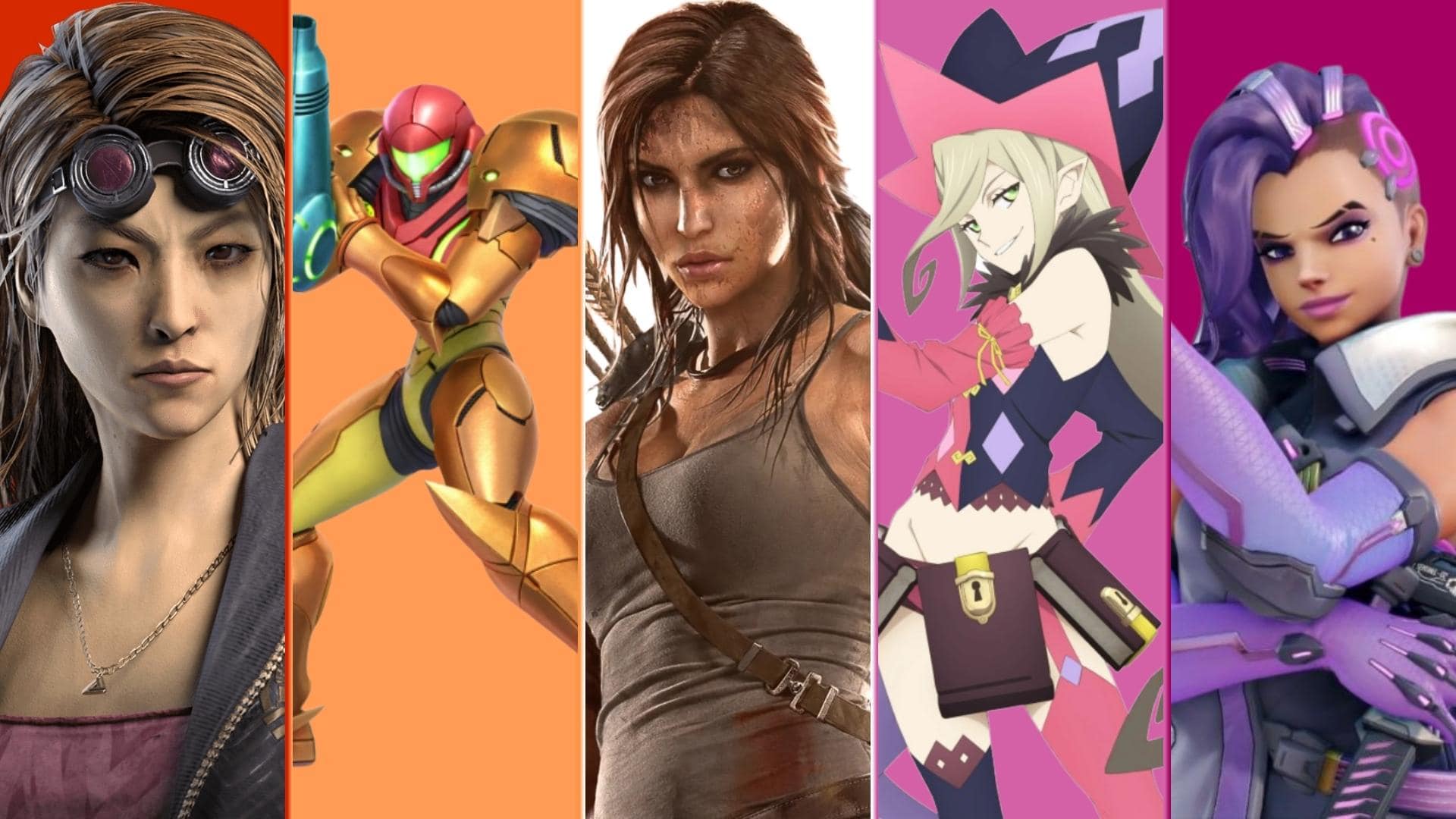
Video game characters that I’ve decided are lesbian icons
Video games have been around for decades now, allowing people to see themselves represented in their favourite characters and experience their stories and adventures. For some, these characters have quickly taken over as being ‘more than just a video game character’, but a figure of comfort that speaks directly to players. This goes double for players who aren’t cis, heterosexual or white, and desperately wish to see themselves in video game characters and, for me, that just means I want to see more lesbians.
Let me clarify: I’m a bisexual, panromantic woman with a strong preference for other ladies, but I didn’t get to that label of acceptance until recently. Nor does that negate my desire to see more video game characters that are lesbians, because let’s be honest, not all of us can see ourselves in Ellie from The Last of Us, the poster child of video game lesbianism since 2014.
Because Ellie is such a monumental character outside of her sexuality, it’s easy to see why she’s held in such high regard. But she’s one lesbian out of (maybe?) a handful. There needs to be more, and I’m almost certain there will be…
Until more video games can confirm lesbian characters that aren’t one-note, however, I’ve decided to confirm which video game characters I’m 100% certain are lesbians, but just haven’t come out of the closet just yet. It’s okay ladies, you take your time.

Yui Kimura (Dead by Daylight)
Dead by Daylight recently confirmed their first gay character, David King. I’ll be honest, I was disappointed considering Yui, a hardened Japanese street racer who has a backstory where she defies her family and tradition in order to be her authentic self was already right there.
Not only does Yui’s background focus on her defiance to tradition, but it also looks at the young woman’s care and affection for her all-women gang – the Sakura 7. This gang not only blossomed under Yui’s leadership, but returned her affection and supported Yui’s ideals by wearing signature pink hachimakis as a symbol of unity and support for women needing help from stalkers and abusers.
Yui being loved by women and caring for them isn’t exactly all the evidence I need to be like ‘yes, a bit fruity this’ but it certainly helps. That’s before you even consider that the only male relationships Yui has is with her grandfather, her strained relationship with her father, and a friend who almost loses his life during a race.
Fruity? Fruity.

Samus Aran (Metroid)
Would it really be a list about lesbians and video game characters if it didn’t include Samus Aran from Metroid? I really don’t think it would.
Samus has a wild and often contentious past, largely due to her character being a blank slate throughout the first early Metroid games. For the most part, Samus is barely seen as anything but a lethal warrior who strips down to her undies if you pass the ‘right conditions’ of the game. That eventually changed as the series developed, but for the most part, Samus is a character that’s identity changes with perception. So, with that in mind, why shouldn’t Samus be a lesbian? I’ve said she is, so that’s that.
Outside of my inconclusive thoughts, the queer community surrounding Metroid often has fixated on the mysterious protagonist is that of a trans lesbian. Trans because of a 1994 interview – as well as the presentation of Samus throughout the first game – with an artist named Hirofumi Matsuoka where they implied she was transgender. And as for her being a lesbian… Well, there is this particular panel in the Metroid manga where Samus is fawned over by women and doesn’t seem the least bit bothered. Good for her.

Lara Croft (Tomb Raider)
Lara Croft is one of the most influential female figures in video games and will remain as such, until the very end of time. She was designed to be sexy (yes, even with triangle-shaped breasts) cunning, and adventurous in a way that made her appealing to look at for (typically male) players. She is also a lesbian, because one, I said so and I find nothing funnier than upsetting straight men and two, Lara Croft’s legacy has evolved beyond being a sexy chess piece that likes to raid tombs.
In the most recent Crystal Dynamics trilogy, players are shown the strong and beautiful relationship between Lara and her best friend, Sam Nishimura. Sam was Lara’s longtime best friend and travelling companion, who unfortunately got kidnapped and left Lara with little choice but to risk life and limb to save her. Which she did. And then a big, giant rainbow followed the two of them as Lara took Sam to safety. Real subtle.
After the first game however, Sam and Lara’s relationship was practically non-existent. Whether that was due to pressure to keep Lara appealing to a straight, male audience or because of something else entirely we’ll probably never know. What we do know though is that in Tomb Raider: Inferno, a comic following Lara and Sam, Lara was supposed to go through a toxic drug trip from hallucinogenic tree bark, leading her to realize her feelings about Sam and culminate in a passionate kiss between the two tomb raiders… Because ‘oh my god, they were tomb raiders!’
This kiss never happened, but that didn’t stop fans from perceiving the relationship, as well as Lara Croft’s lesbianism, as canon anyway.

Magilou (Tales of Berseria)
Tales of Berseria is possibly one of the queerest JRPGs from the Tales of series, and not just because of the cottagecore, lesbian vibes you experience in the first 10 minutes. You have a protagonist (Velvet Crowe) who doesn’t seem at all interested in men outside of the realm of friendship, a character companion who pointedly stares at another female character’s breasts while making a comment about being good with her hands, and then there’s the whole ‘killing your best friend who you might have been real gay for.’
But for this entry, I won’t be focusing on any of those characters. Instead, I’m going to turn to the character of Magilou, an apathetic witch who tags along with the group for seemingly no other reason but to cause havoc. The main focus of her own unique brand of chaos is Velvet, the main character, and someone who often acts as Magilou’s foil. It is through her journey at Velvet’s side that Magilou learns how to love and feel again, something which she tucked away inside of her in order to stop herself from feeling emotions. At the end of the game, Magilou also calls Velvet the kindred spirit of her soul, which again sounds a bit fruity if you ask me.
Outside of her relationship with Velvet, Magilou shows a real detachment to most things and that’s largely due to her trauma and role in the world of Berseria. The former she eventually overcomes through her friendship with Velvet and others, but the latter means that she’s unable to fully settle down in the cis, heteronormative lifestyle that’s often portrayed in previous Tales of games. Instead, Magilou travels and observes, something which feels similar to me growing up as I watched my friends form heterosexual relationships, leaving me behind in the process.

Sombra (Overwatch)
Sombra broke barriers when she first entered the FPS scene back during BlizzCon’s Overwatch panel in 2016. As Natalie Flores puts it in Rock Paper Shotgun, Sombra was a brown, Latina woman that wasn’t an “amalgamation of stereotypes”, but a character who had a powerful presence and seemed to play an important role in the ‘story’ of Overwatch. Years later, Sombra’s story is still nowhere close to being finished (though she is hardly unique in the case of Overwatch) and what was powerful before now seems like old news.
Even so, Sombra is still a character worthy of merit. She’s an enigma, and one that seems to not only know all of the people she comes across, but holds all of their cards in her hands. She’s cunning, and clever and her disinterest in nothing but discovering the truth makes her interesting and one of my favourite characters within this topsy-turvy series. So, naturally, it would be pretty dope if they made her a lesbian. That’s my only reason, and I’m sticking with it. Sorry.






